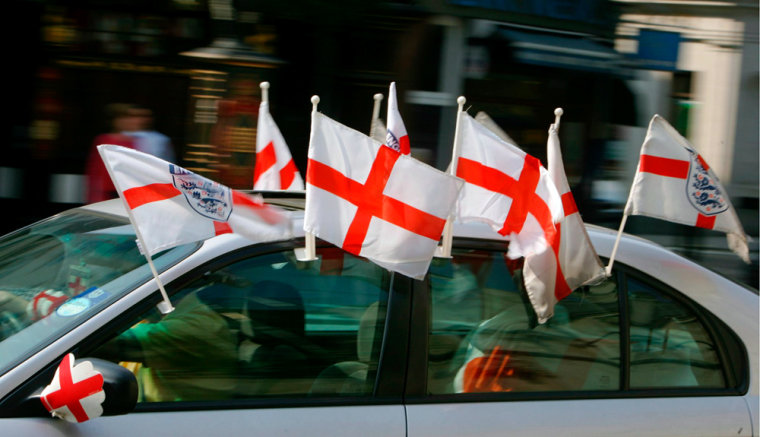LONDON — A few nights ago my German husband shook my shoulders, not long after I finally nodded off.
“Only two more nights to go,” he said, excited as a child.
“What? Why are you waking me up?” I replied.
I thought and thought, but couldn’t for the life of me figure out what could he be talking about.
“The football World Cup,” he said, not understanding how I couldn’t have guessed that from the get-go.
So it is on this side of the ocean these days, with the entire country — and continent — preoccupied by what’s most likely the world’s biggest sporting event.
That’s right, forget the Olympics; they pale in comparison to the popularity of the World Cup. England’s St. George’s cross hangs on every available surface. Lighters, key chains, t-shirts, hats, you name it and it’s being worn by fans around the country.
Movie theaters have been converted into television screening rooms, and every pub in London seems to be advertising their lounge as the place to be on Saturday at 2 p.m. — England’s kickoff game against Paraguay.
The city will most likely grind to a halt then and during England’s other match-ups. One London taxi company even sent around a notice telling passengers to expect longer waits during England’s games.
“With so many keen soccer fans amongst our London taxi drivers, the temptation for staying at home to watch a key game on TV may, at times, prove too much to resist,” said the announcement, making no apologies.
'Like a little kid at Christmas'
England’s chances of success — not very high, according to sports commentators — are irrelevant for most fans.
“I’m like a little kid at Christmas. It’s like the 23rd of December,” said one England fan. “Mind you in two weeks I’ll be dejected when they’re out.”
For an American the football obsession can be confounding. To understand, one has to actually be here to feel the passion.
Nearly every advertisement on TV is from a World Cup sponsor, British news crews follow the English team’s every move — including their bus journey to the airport and star player Wayne Rooney’s scan on his injured foot.
“The smile England’s been waiting for,” read the front page newspaper caption on a shot of Rooney walking in Manchester after a positive foot scan on Wednesday.
People who don’t normally follow football can name every person on the England team, along with the stars of the other top teams. And there is no gender gap among “World Cup fans.” Women follow the starts, schedules and coach’s foibles as much as the men.
The World Cup is as close as it gets to World War, say the locals. I’ve been warned to watch out if England ends up playing France or Germany.
Avoid stupid questions
Never hear of Maradona, Best or Ronaldinho? If not, look them up — and don’t be dumb enough to ask a European who they are. They will just shake their head in dismay and look at you like you fell off the moon.
And England isn’t the only place where World Cup fever has taken over. Germany, the host of the Fussball-Weltmeisterschaft, has been counting down for months; there's hardly a person in the country that doesn't know how many hours remain until the first game.
Berlin’s Alexanderplatz TV tower is decorated as a soccer ball, as are bushes and any other object that can be made round across the city. Paris is covered in signs for a movie about soccer star and modern legend Zinedine Zidane.
This afternoon, trying to make plans for the weekend, I called my husband and asked if he would be home late on Friday.
“Will I be home late?” he asked rhetorically.
This time, the answer came to me a little faster. “Oh right, the first game of the World Cup starts at 5 p.m.,” I answered, proud that I guessed it this time.
“You’re finally getting it,” he said.
There is hope for an American in Europe after all.
